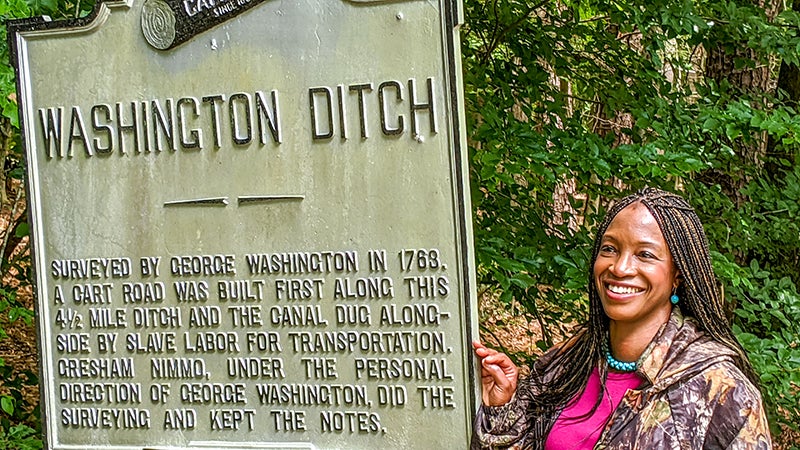Fish and Wildlife Service director tours Great Dismal Swamp
Published 10:07 pm Monday, July 13, 2020

- U.S. Fish and Wildlife Service Director Aurelia Skipwith toured the Great Dismal Swamp National Wildlife Refuge last week. She promoted public lands as a good place to be active while keeping one’s distance from others.
|
Getting your Trinity Audio player ready...
|
The director of the U.S. Fish and Wildlife Service joked during her tour of the Great Dismal Swamp National Wildlife Refuge that in it, she found a place more humid than Washington, D.C.
Aurelia Skipwith toured the Great Dismal Swamp to learn about its history and programs while promoting it and other outdoor refuges as safe places to practice social distancing.
As part of her visit, Skipwith toured parts of the refuge with its manager, Chris Lowie, visiting the Jericho Ditch and Washington Ditch trail heads, as well as the Underground Railroad Education Pavilion.
“We’re glad to have her here visiting to learn about the history of the refuge and also highlight public access and how important our federal lands are,” Lowie said.
While at Jericho Ditch, Lowie noted that the refuge had bought an eight acre, L-shaped parcel there in January with Land and Water Conservation Fund money. He outlined future plans to extend the trailhead at Jericho Ditch to add parking, a kiosk, a park, an environmental education center and visitor contact station, showing Skipwith renderings of what it would look like. He also said he wanted to use LWCF money to acquire more nearby properties to create a strong access point.
“It’s a vision, it’s my vison, it’s the community’s vision,” Lowie said. “So we’re excited about it.”
Skipwith said it is important for people to understand the history of the refuge, and other refuges around the country, because it helps to understand the resiliency the country needs.
“As I’m going around to different places, every place is unique and different,” Skipwith said during her July 9 visit. “But it’s not only just the beauty and the nature that’s here, it’s the untold story, the history, especially now, as we’re learning about what is our American history. And there’s different cultures, and it’s learning what those stories are because it’s a fabric that links us all together.”
In touring parts of the Great Dismal Swamp, Skipwith also sought to stress the refuges as welcoming spots for visitors. Refuges, she said, are hidden treasures for communities.
“We’re open,” Skipwith said. “There’s no better place to social distance than in our public land, so that’s why I’m here and that’s part of my tour.”
While walking the Washington Ditch boardwalk trail, Skipwith donned a camouflage jacket to help ward off the yellow flies swarming through the swamp while getting a narrated tour from Lowie.
During her visit, Skipwith spoke on a conference call with Congressman Donald McEachin, as the U.S. Senate passed the Great American Outdoors Act in June.
If it passes the House of Representatives, the act would provide a permanent source of funding for the Land and Water Conservation Fund, helping move forward with some of the Fish and Wildlife Services’ $1.3 billion worth of deferred maintenance projects.
McEachin said in a statement that he is committed to preserving and protecting the Great Dismal Swamp.
“The Great Dismal Swamp is a great American storyteller — commemorating people, cultures, and events that are key both to the Commonwealth’s history and our nation’s history,” McEachin said. “I am pleased that the land acquired through the use of the Land and Water Conservation Fund will further protect this sacred space, while also expanding and improving public access to outdoor places for my constituents. As the sponsor of the Great Dismal Swamp National Heritage Area Act and a co-sponsor of the Great American Outdoors Act, conserving the Great Dismal Swamp — and our nation’s irreplaceable public lands — is a top priority.”
While at Jericho Ditch, Lowie noted that the refuge had bought an eight acre, L-shaped parcel there in January with Land and Water Conservation Fund money. He outlined future plans to extend the trailhead at Jericho Ditch to add parking, a kiosk, a park, an environmental education center and visitor contact station, showing Skipwith renderings of what it would look like. He also said he wanted to use LWCF money to acquire more nearby properties to create a strong access point.
“It’s a vision, it’s my vison, it’s the community’s vision,” Lowie said. “So we’re excited about it.”






